BULAW5916 Taxation Law: Compliance in the Gig Economy - Australia
VerifiedAdded on 2023/03/17
|9
|2465
|93
Essay
AI Summary
This essay examines the complexities of taxation law within Australia's gig economy, focusing on the challenges and opportunities presented by platforms like Uber and Airbnb. It explores the current state of tax compliance, highlighting the issues of tax evasion and underreporting of income by taskforces and independent contractors operating within this sector. The essay delves into the Australian Taxation Office's (ATO) proposed strategies to address these issues, including reporting requirements for operators and the potential impact on both taskforces and operators. It analyzes the compliance of major gig economy operators and the potential problems associated with the proposed structure, such as data privacy concerns and the need for tailored approaches. Furthermore, the essay provides recommendations for improving tax compliance within the gig economy, including the need for registration towards the GST regime. The essay draws on a range of sources, including news articles and academic research, to provide a comprehensive overview of the topic.
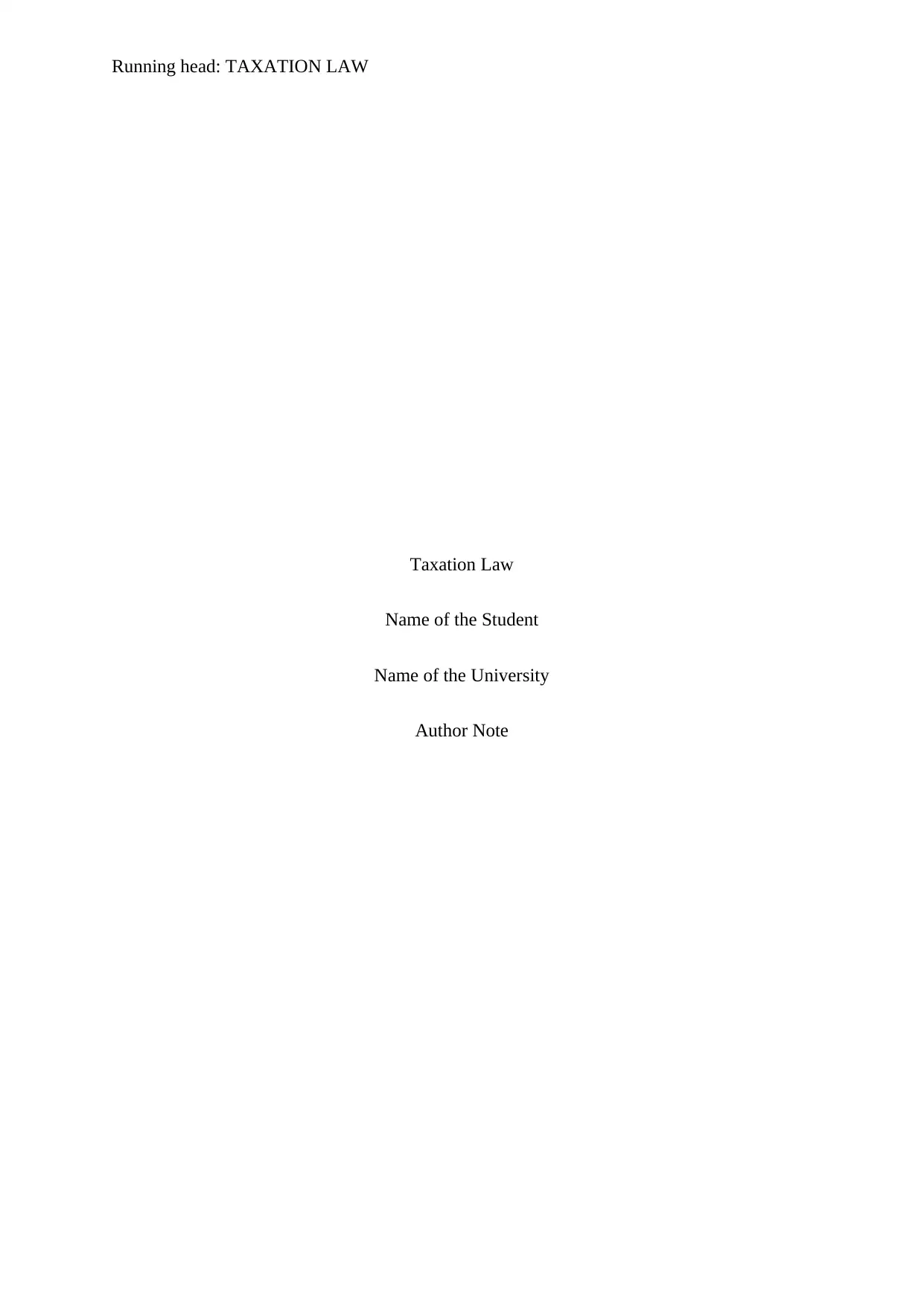
Running head: TAXATION LAW
Taxation Law
Name of the Student
Name of the University
Author Note
Taxation Law
Name of the Student
Name of the University
Author Note
Paraphrase This Document
Need a fresh take? Get an instant paraphrase of this document with our AI Paraphraser
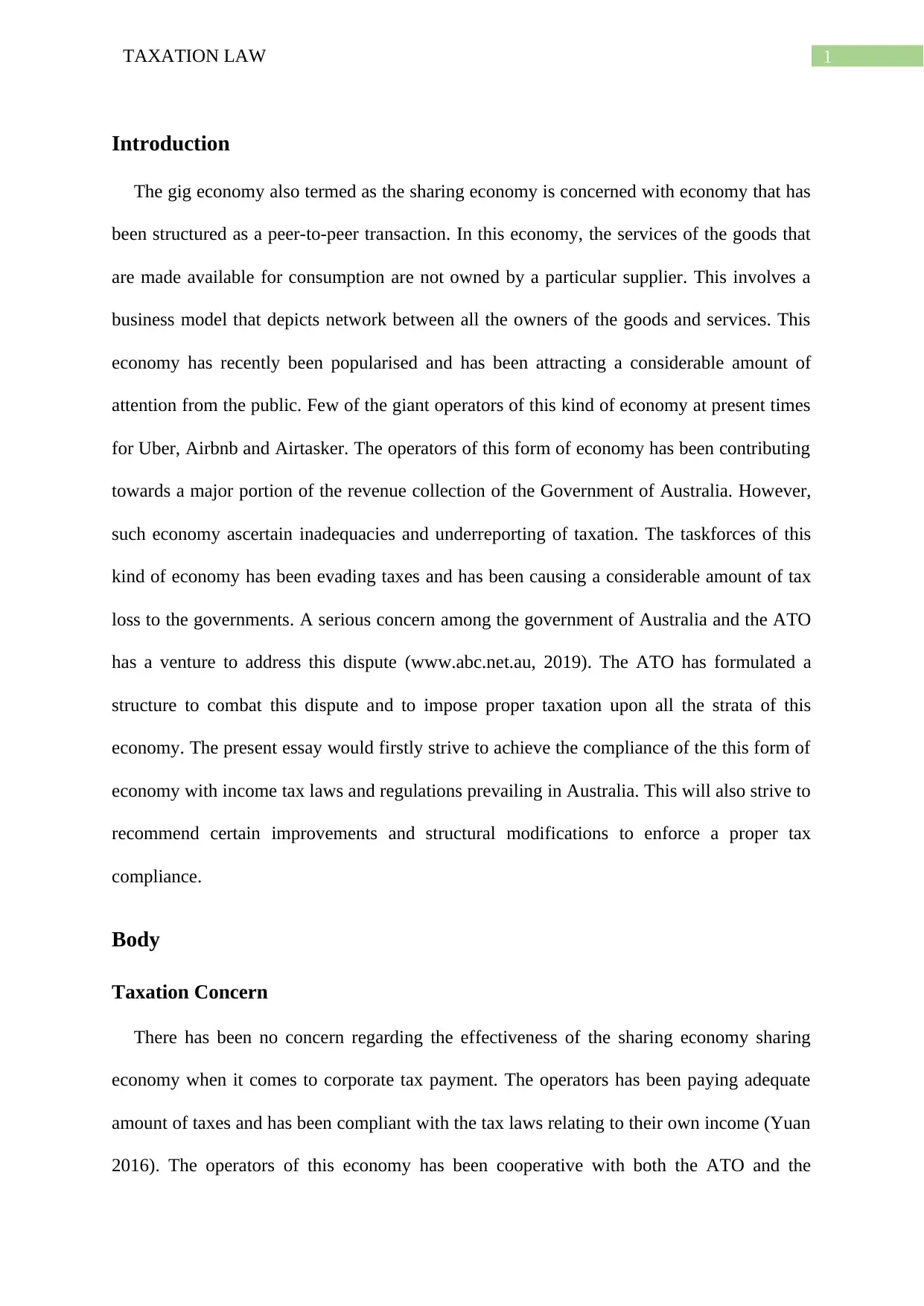
1TAXATION LAW
Introduction
The gig economy also termed as the sharing economy is concerned with economy that has
been structured as a peer-to-peer transaction. In this economy, the services of the goods that
are made available for consumption are not owned by a particular supplier. This involves a
business model that depicts network between all the owners of the goods and services. This
economy has recently been popularised and has been attracting a considerable amount of
attention from the public. Few of the giant operators of this kind of economy at present times
for Uber, Airbnb and Airtasker. The operators of this form of economy has been contributing
towards a major portion of the revenue collection of the Government of Australia. However,
such economy ascertain inadequacies and underreporting of taxation. The taskforces of this
kind of economy has been evading taxes and has been causing a considerable amount of tax
loss to the governments. A serious concern among the government of Australia and the ATO
has a venture to address this dispute (www.abc.net.au, 2019). The ATO has formulated a
structure to combat this dispute and to impose proper taxation upon all the strata of this
economy. The present essay would firstly strive to achieve the compliance of the this form of
economy with income tax laws and regulations prevailing in Australia. This will also strive to
recommend certain improvements and structural modifications to enforce a proper tax
compliance.
Body
Taxation Concern
There has been no concern regarding the effectiveness of the sharing economy sharing
economy when it comes to corporate tax payment. The operators has been paying adequate
amount of taxes and has been compliant with the tax laws relating to their own income (Yuan
2016). The operators of this economy has been cooperative with both the ATO and the
Introduction
The gig economy also termed as the sharing economy is concerned with economy that has
been structured as a peer-to-peer transaction. In this economy, the services of the goods that
are made available for consumption are not owned by a particular supplier. This involves a
business model that depicts network between all the owners of the goods and services. This
economy has recently been popularised and has been attracting a considerable amount of
attention from the public. Few of the giant operators of this kind of economy at present times
for Uber, Airbnb and Airtasker. The operators of this form of economy has been contributing
towards a major portion of the revenue collection of the Government of Australia. However,
such economy ascertain inadequacies and underreporting of taxation. The taskforces of this
kind of economy has been evading taxes and has been causing a considerable amount of tax
loss to the governments. A serious concern among the government of Australia and the ATO
has a venture to address this dispute (www.abc.net.au, 2019). The ATO has formulated a
structure to combat this dispute and to impose proper taxation upon all the strata of this
economy. The present essay would firstly strive to achieve the compliance of the this form of
economy with income tax laws and regulations prevailing in Australia. This will also strive to
recommend certain improvements and structural modifications to enforce a proper tax
compliance.
Body
Taxation Concern
There has been no concern regarding the effectiveness of the sharing economy sharing
economy when it comes to corporate tax payment. The operators has been paying adequate
amount of taxes and has been compliant with the tax laws relating to their own income (Yuan
2016). The operators of this economy has been cooperative with both the ATO and the
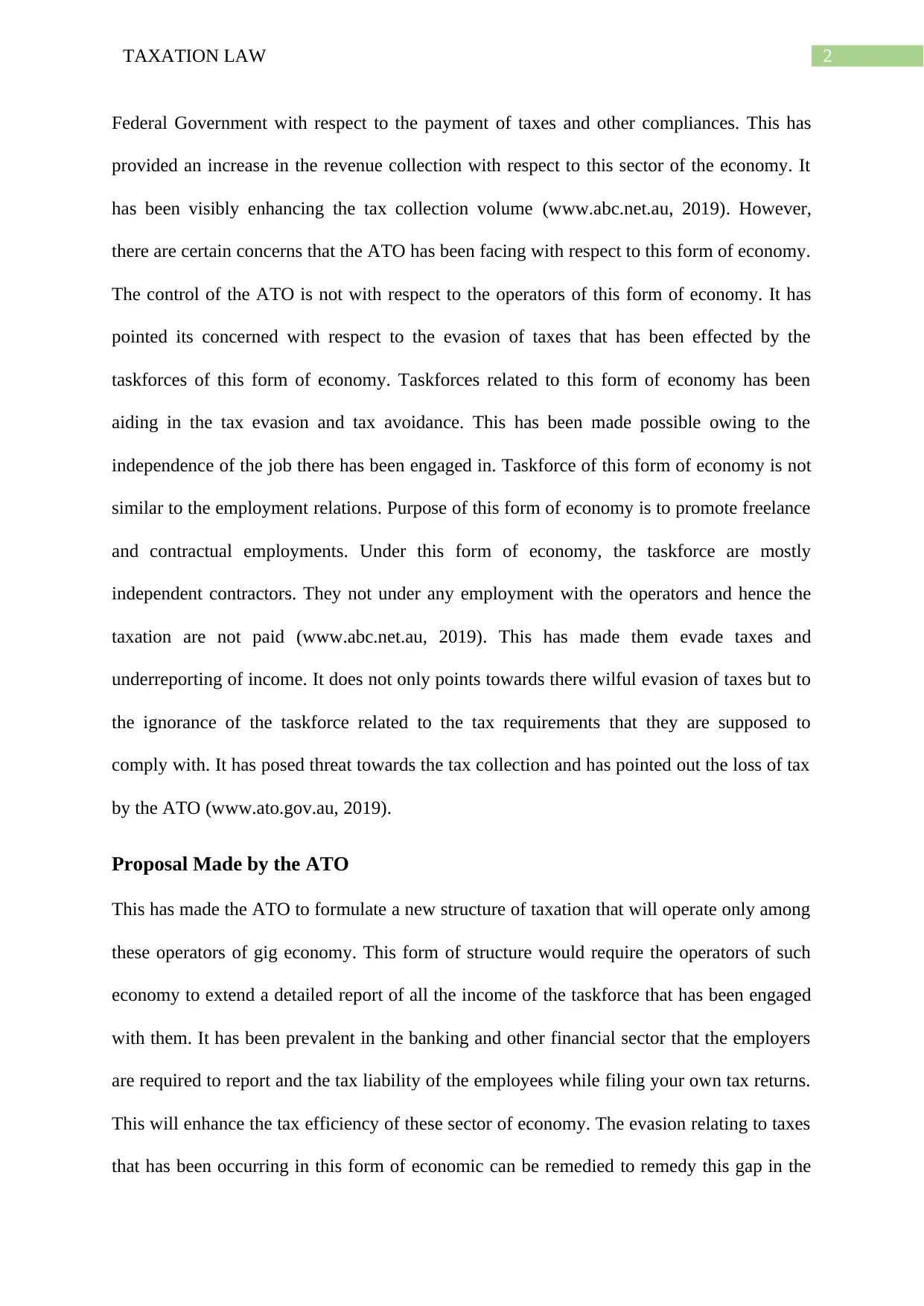
2TAXATION LAW
Federal Government with respect to the payment of taxes and other compliances. This has
provided an increase in the revenue collection with respect to this sector of the economy. It
has been visibly enhancing the tax collection volume (www.abc.net.au, 2019). However,
there are certain concerns that the ATO has been facing with respect to this form of economy.
The control of the ATO is not with respect to the operators of this form of economy. It has
pointed its concerned with respect to the evasion of taxes that has been effected by the
taskforces of this form of economy. Taskforces related to this form of economy has been
aiding in the tax evasion and tax avoidance. This has been made possible owing to the
independence of the job there has been engaged in. Taskforce of this form of economy is not
similar to the employment relations. Purpose of this form of economy is to promote freelance
and contractual employments. Under this form of economy, the taskforce are mostly
independent contractors. They not under any employment with the operators and hence the
taxation are not paid (www.abc.net.au, 2019). This has made them evade taxes and
underreporting of income. It does not only points towards there wilful evasion of taxes but to
the ignorance of the taskforce related to the tax requirements that they are supposed to
comply with. It has posed threat towards the tax collection and has pointed out the loss of tax
by the ATO (www.ato.gov.au, 2019).
Proposal Made by the ATO
This has made the ATO to formulate a new structure of taxation that will operate only among
these operators of gig economy. This form of structure would require the operators of such
economy to extend a detailed report of all the income of the taskforce that has been engaged
with them. It has been prevalent in the banking and other financial sector that the employers
are required to report and the tax liability of the employees while filing your own tax returns.
This will enhance the tax efficiency of these sector of economy. The evasion relating to taxes
that has been occurring in this form of economic can be remedied to remedy this gap in the
Federal Government with respect to the payment of taxes and other compliances. This has
provided an increase in the revenue collection with respect to this sector of the economy. It
has been visibly enhancing the tax collection volume (www.abc.net.au, 2019). However,
there are certain concerns that the ATO has been facing with respect to this form of economy.
The control of the ATO is not with respect to the operators of this form of economy. It has
pointed its concerned with respect to the evasion of taxes that has been effected by the
taskforces of this form of economy. Taskforces related to this form of economy has been
aiding in the tax evasion and tax avoidance. This has been made possible owing to the
independence of the job there has been engaged in. Taskforce of this form of economy is not
similar to the employment relations. Purpose of this form of economy is to promote freelance
and contractual employments. Under this form of economy, the taskforce are mostly
independent contractors. They not under any employment with the operators and hence the
taxation are not paid (www.abc.net.au, 2019). This has made them evade taxes and
underreporting of income. It does not only points towards there wilful evasion of taxes but to
the ignorance of the taskforce related to the tax requirements that they are supposed to
comply with. It has posed threat towards the tax collection and has pointed out the loss of tax
by the ATO (www.ato.gov.au, 2019).
Proposal Made by the ATO
This has made the ATO to formulate a new structure of taxation that will operate only among
these operators of gig economy. This form of structure would require the operators of such
economy to extend a detailed report of all the income of the taskforce that has been engaged
with them. It has been prevalent in the banking and other financial sector that the employers
are required to report and the tax liability of the employees while filing your own tax returns.
This will enhance the tax efficiency of these sector of economy. The evasion relating to taxes
that has been occurring in this form of economic can be remedied to remedy this gap in the
⊘ This is a preview!⊘
Do you want full access?
Subscribe today to unlock all pages.

Trusted by 1+ million students worldwide
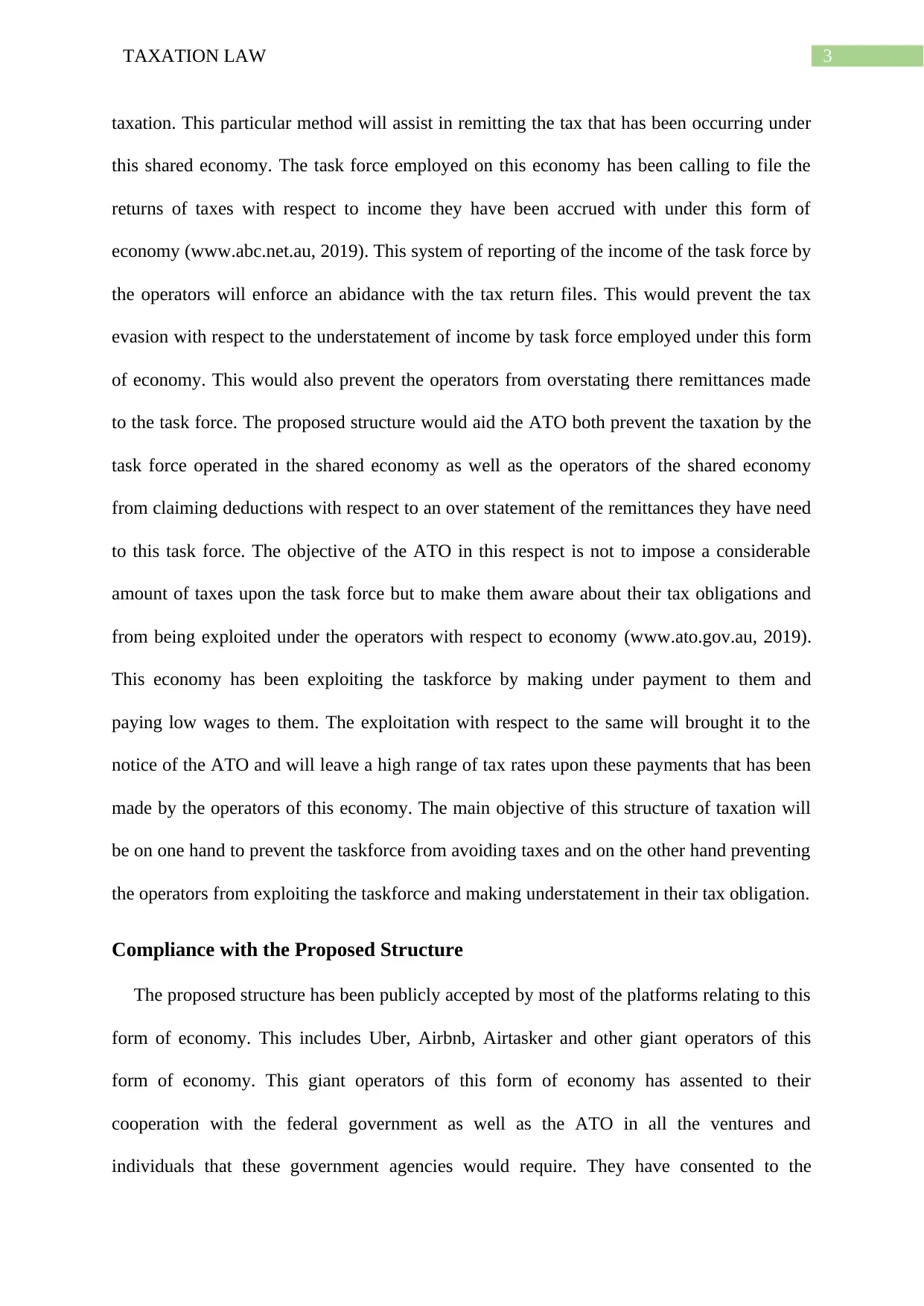
3TAXATION LAW
taxation. This particular method will assist in remitting the tax that has been occurring under
this shared economy. The task force employed on this economy has been calling to file the
returns of taxes with respect to income they have been accrued with under this form of
economy (www.abc.net.au, 2019). This system of reporting of the income of the task force by
the operators will enforce an abidance with the tax return files. This would prevent the tax
evasion with respect to the understatement of income by task force employed under this form
of economy. This would also prevent the operators from overstating there remittances made
to the task force. The proposed structure would aid the ATO both prevent the taxation by the
task force operated in the shared economy as well as the operators of the shared economy
from claiming deductions with respect to an over statement of the remittances they have need
to this task force. The objective of the ATO in this respect is not to impose a considerable
amount of taxes upon the task force but to make them aware about their tax obligations and
from being exploited under the operators with respect to economy (www.ato.gov.au, 2019).
This economy has been exploiting the taskforce by making under payment to them and
paying low wages to them. The exploitation with respect to the same will brought it to the
notice of the ATO and will leave a high range of tax rates upon these payments that has been
made by the operators of this economy. The main objective of this structure of taxation will
be on one hand to prevent the taskforce from avoiding taxes and on the other hand preventing
the operators from exploiting the taskforce and making understatement in their tax obligation.
Compliance with the Proposed Structure
The proposed structure has been publicly accepted by most of the platforms relating to this
form of economy. This includes Uber, Airbnb, Airtasker and other giant operators of this
form of economy. This giant operators of this form of economy has assented to their
cooperation with the federal government as well as the ATO in all the ventures and
individuals that these government agencies would require. They have consented to the
taxation. This particular method will assist in remitting the tax that has been occurring under
this shared economy. The task force employed on this economy has been calling to file the
returns of taxes with respect to income they have been accrued with under this form of
economy (www.abc.net.au, 2019). This system of reporting of the income of the task force by
the operators will enforce an abidance with the tax return files. This would prevent the tax
evasion with respect to the understatement of income by task force employed under this form
of economy. This would also prevent the operators from overstating there remittances made
to the task force. The proposed structure would aid the ATO both prevent the taxation by the
task force operated in the shared economy as well as the operators of the shared economy
from claiming deductions with respect to an over statement of the remittances they have need
to this task force. The objective of the ATO in this respect is not to impose a considerable
amount of taxes upon the task force but to make them aware about their tax obligations and
from being exploited under the operators with respect to economy (www.ato.gov.au, 2019).
This economy has been exploiting the taskforce by making under payment to them and
paying low wages to them. The exploitation with respect to the same will brought it to the
notice of the ATO and will leave a high range of tax rates upon these payments that has been
made by the operators of this economy. The main objective of this structure of taxation will
be on one hand to prevent the taskforce from avoiding taxes and on the other hand preventing
the operators from exploiting the taskforce and making understatement in their tax obligation.
Compliance with the Proposed Structure
The proposed structure has been publicly accepted by most of the platforms relating to this
form of economy. This includes Uber, Airbnb, Airtasker and other giant operators of this
form of economy. This giant operators of this form of economy has assented to their
cooperation with the federal government as well as the ATO in all the ventures and
individuals that these government agencies would require. They have consented to the
Paraphrase This Document
Need a fresh take? Get an instant paraphrase of this document with our AI Paraphraser
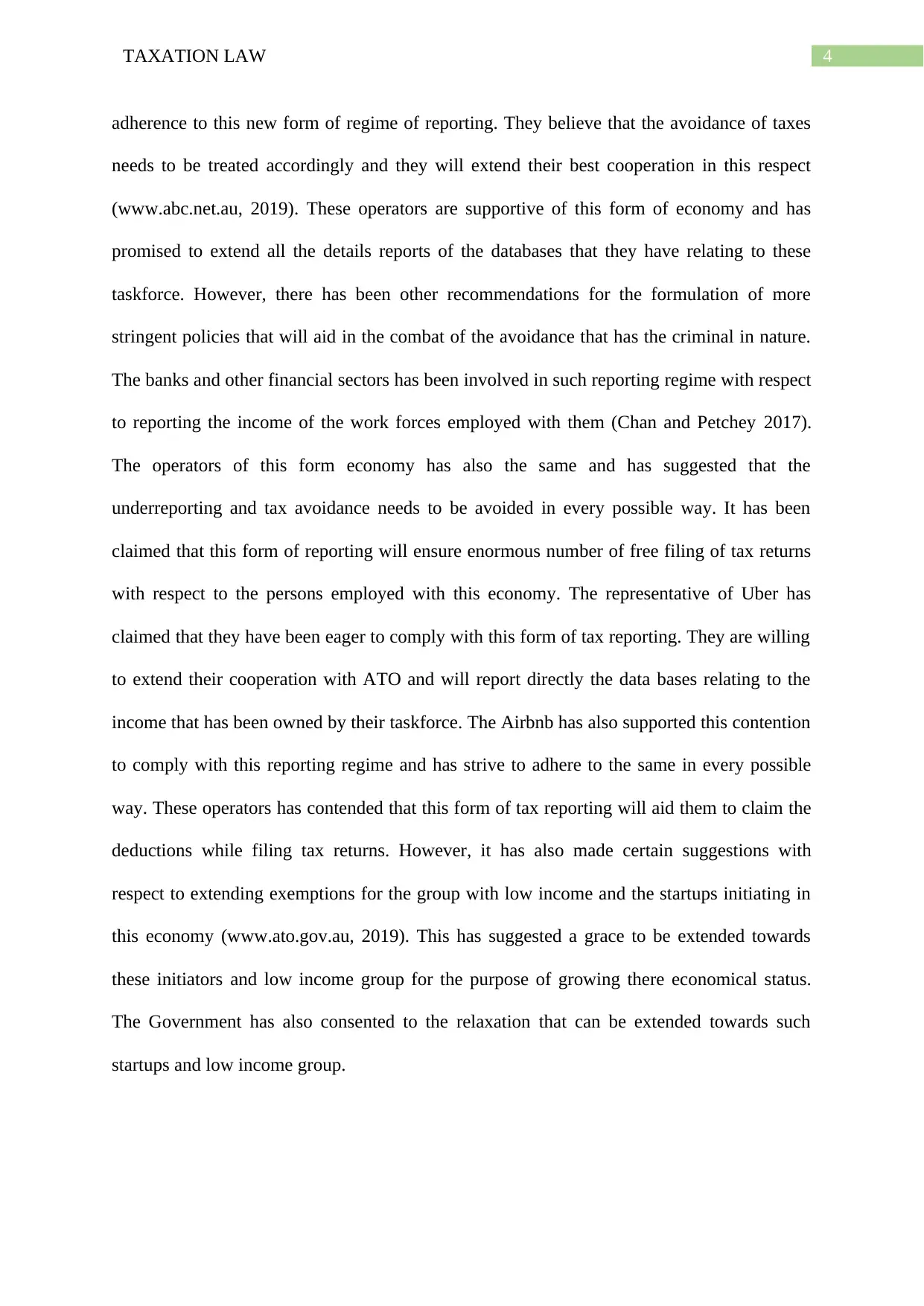
4TAXATION LAW
adherence to this new form of regime of reporting. They believe that the avoidance of taxes
needs to be treated accordingly and they will extend their best cooperation in this respect
(www.abc.net.au, 2019). These operators are supportive of this form of economy and has
promised to extend all the details reports of the databases that they have relating to these
taskforce. However, there has been other recommendations for the formulation of more
stringent policies that will aid in the combat of the avoidance that has the criminal in nature.
The banks and other financial sectors has been involved in such reporting regime with respect
to reporting the income of the work forces employed with them (Chan and Petchey 2017).
The operators of this form economy has also the same and has suggested that the
underreporting and tax avoidance needs to be avoided in every possible way. It has been
claimed that this form of reporting will ensure enormous number of free filing of tax returns
with respect to the persons employed with this economy. The representative of Uber has
claimed that they have been eager to comply with this form of tax reporting. They are willing
to extend their cooperation with ATO and will report directly the data bases relating to the
income that has been owned by their taskforce. The Airbnb has also supported this contention
to comply with this reporting regime and has strive to adhere to the same in every possible
way. These operators has contended that this form of tax reporting will aid them to claim the
deductions while filing tax returns. However, it has also made certain suggestions with
respect to extending exemptions for the group with low income and the startups initiating in
this economy (www.ato.gov.au, 2019). This has suggested a grace to be extended towards
these initiators and low income group for the purpose of growing there economical status.
The Government has also consented to the relaxation that can be extended towards such
startups and low income group.
adherence to this new form of regime of reporting. They believe that the avoidance of taxes
needs to be treated accordingly and they will extend their best cooperation in this respect
(www.abc.net.au, 2019). These operators are supportive of this form of economy and has
promised to extend all the details reports of the databases that they have relating to these
taskforce. However, there has been other recommendations for the formulation of more
stringent policies that will aid in the combat of the avoidance that has the criminal in nature.
The banks and other financial sectors has been involved in such reporting regime with respect
to reporting the income of the work forces employed with them (Chan and Petchey 2017).
The operators of this form economy has also the same and has suggested that the
underreporting and tax avoidance needs to be avoided in every possible way. It has been
claimed that this form of reporting will ensure enormous number of free filing of tax returns
with respect to the persons employed with this economy. The representative of Uber has
claimed that they have been eager to comply with this form of tax reporting. They are willing
to extend their cooperation with ATO and will report directly the data bases relating to the
income that has been owned by their taskforce. The Airbnb has also supported this contention
to comply with this reporting regime and has strive to adhere to the same in every possible
way. These operators has contended that this form of tax reporting will aid them to claim the
deductions while filing tax returns. However, it has also made certain suggestions with
respect to extending exemptions for the group with low income and the startups initiating in
this economy (www.ato.gov.au, 2019). This has suggested a grace to be extended towards
these initiators and low income group for the purpose of growing there economical status.
The Government has also consented to the relaxation that can be extended towards such
startups and low income group.
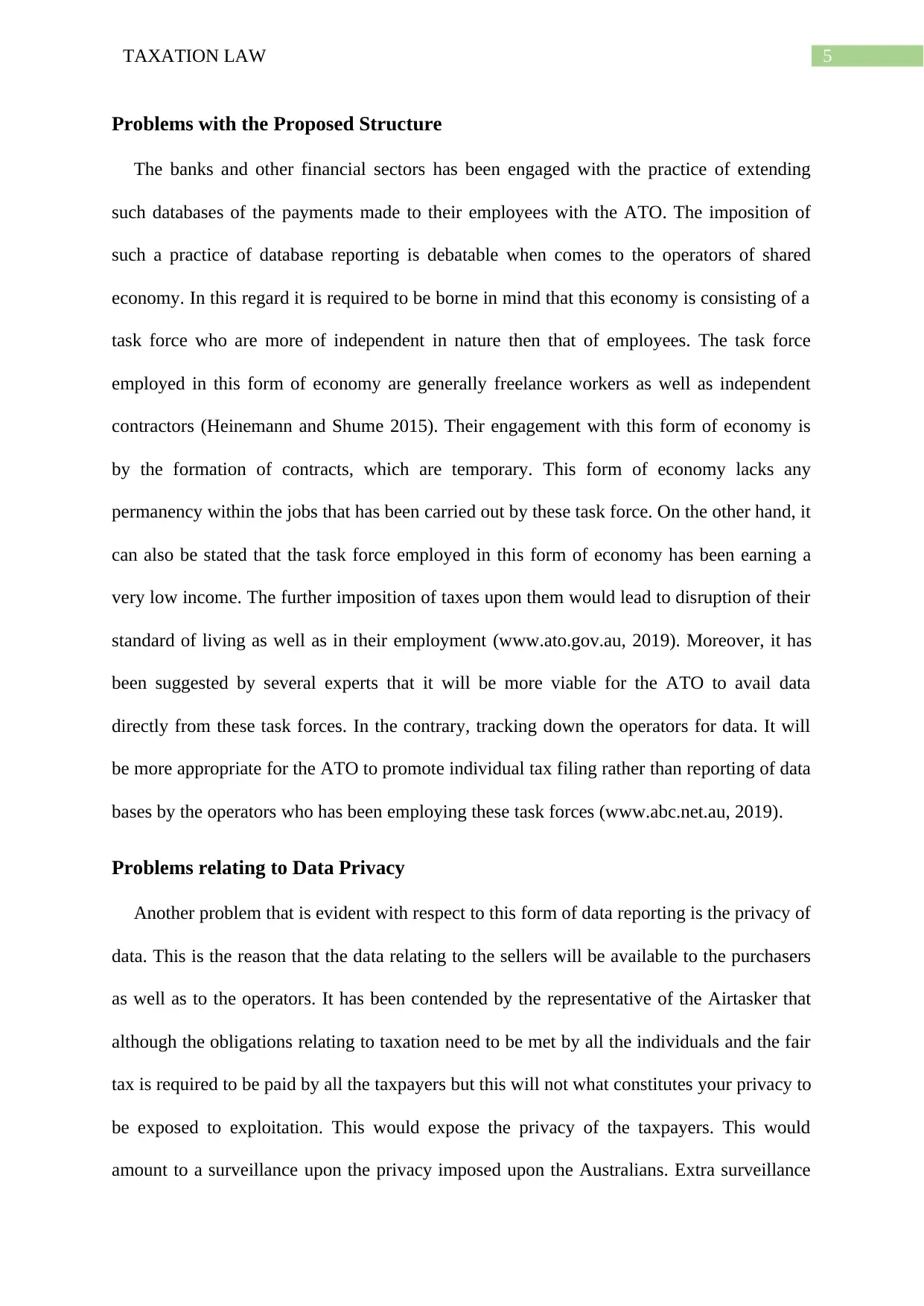
5TAXATION LAW
Problems with the Proposed Structure
The banks and other financial sectors has been engaged with the practice of extending
such databases of the payments made to their employees with the ATO. The imposition of
such a practice of database reporting is debatable when comes to the operators of shared
economy. In this regard it is required to be borne in mind that this economy is consisting of a
task force who are more of independent in nature then that of employees. The task force
employed in this form of economy are generally freelance workers as well as independent
contractors (Heinemann and Shume 2015). Their engagement with this form of economy is
by the formation of contracts, which are temporary. This form of economy lacks any
permanency within the jobs that has been carried out by these task force. On the other hand, it
can also be stated that the task force employed in this form of economy has been earning a
very low income. The further imposition of taxes upon them would lead to disruption of their
standard of living as well as in their employment (www.ato.gov.au, 2019). Moreover, it has
been suggested by several experts that it will be more viable for the ATO to avail data
directly from these task forces. In the contrary, tracking down the operators for data. It will
be more appropriate for the ATO to promote individual tax filing rather than reporting of data
bases by the operators who has been employing these task forces (www.abc.net.au, 2019).
Problems relating to Data Privacy
Another problem that is evident with respect to this form of data reporting is the privacy of
data. This is the reason that the data relating to the sellers will be available to the purchasers
as well as to the operators. It has been contended by the representative of the Airtasker that
although the obligations relating to taxation need to be met by all the individuals and the fair
tax is required to be paid by all the taxpayers but this will not what constitutes your privacy to
be exposed to exploitation. This would expose the privacy of the taxpayers. This would
amount to a surveillance upon the privacy imposed upon the Australians. Extra surveillance
Problems with the Proposed Structure
The banks and other financial sectors has been engaged with the practice of extending
such databases of the payments made to their employees with the ATO. The imposition of
such a practice of database reporting is debatable when comes to the operators of shared
economy. In this regard it is required to be borne in mind that this economy is consisting of a
task force who are more of independent in nature then that of employees. The task force
employed in this form of economy are generally freelance workers as well as independent
contractors (Heinemann and Shume 2015). Their engagement with this form of economy is
by the formation of contracts, which are temporary. This form of economy lacks any
permanency within the jobs that has been carried out by these task force. On the other hand, it
can also be stated that the task force employed in this form of economy has been earning a
very low income. The further imposition of taxes upon them would lead to disruption of their
standard of living as well as in their employment (www.ato.gov.au, 2019). Moreover, it has
been suggested by several experts that it will be more viable for the ATO to avail data
directly from these task forces. In the contrary, tracking down the operators for data. It will
be more appropriate for the ATO to promote individual tax filing rather than reporting of data
bases by the operators who has been employing these task forces (www.abc.net.au, 2019).
Problems relating to Data Privacy
Another problem that is evident with respect to this form of data reporting is the privacy of
data. This is the reason that the data relating to the sellers will be available to the purchasers
as well as to the operators. It has been contended by the representative of the Airtasker that
although the obligations relating to taxation need to be met by all the individuals and the fair
tax is required to be paid by all the taxpayers but this will not what constitutes your privacy to
be exposed to exploitation. This would expose the privacy of the taxpayers. This would
amount to a surveillance upon the privacy imposed upon the Australians. Extra surveillance
⊘ This is a preview!⊘
Do you want full access?
Subscribe today to unlock all pages.

Trusted by 1+ million students worldwide
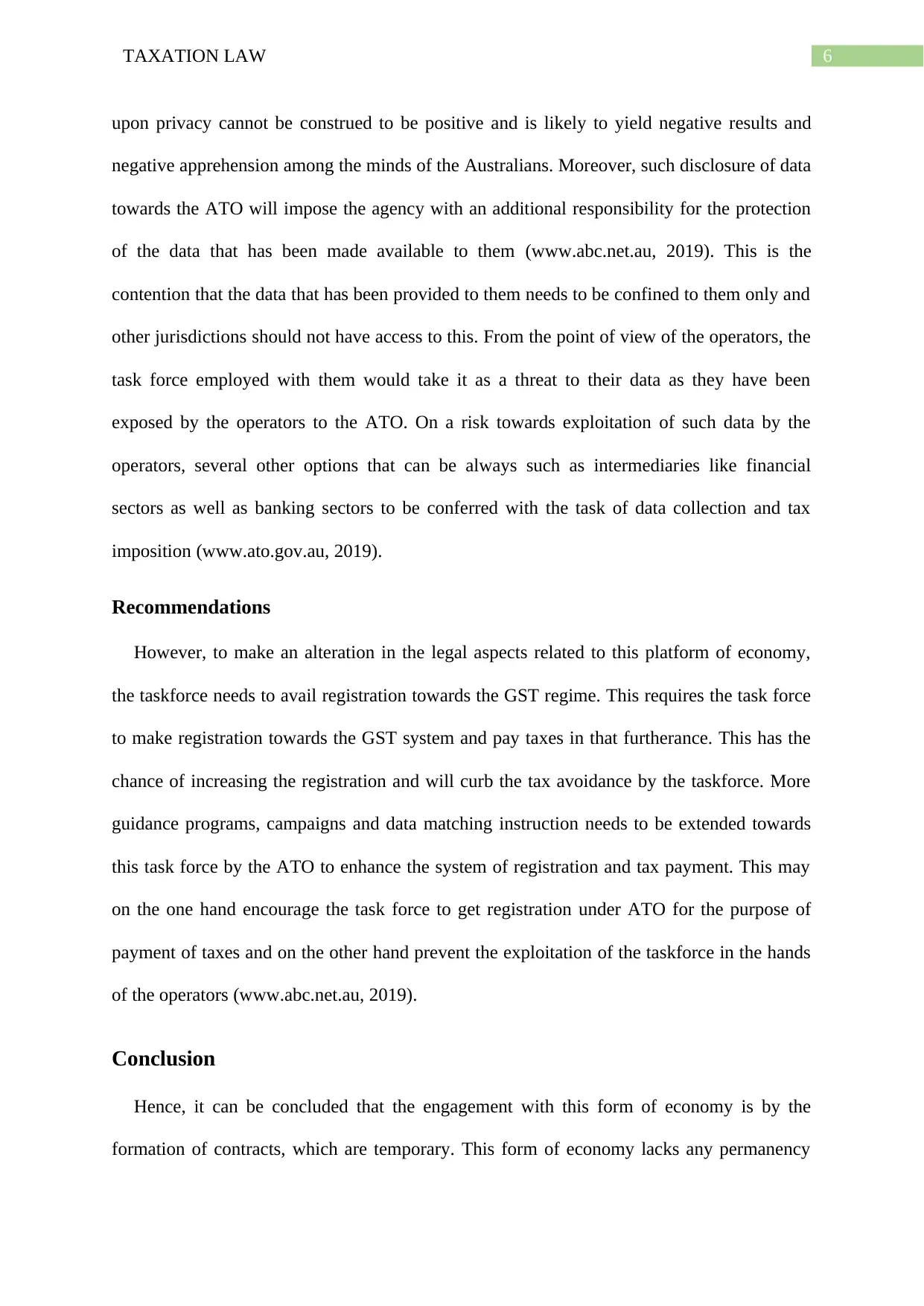
6TAXATION LAW
upon privacy cannot be construed to be positive and is likely to yield negative results and
negative apprehension among the minds of the Australians. Moreover, such disclosure of data
towards the ATO will impose the agency with an additional responsibility for the protection
of the data that has been made available to them (www.abc.net.au, 2019). This is the
contention that the data that has been provided to them needs to be confined to them only and
other jurisdictions should not have access to this. From the point of view of the operators, the
task force employed with them would take it as a threat to their data as they have been
exposed by the operators to the ATO. On a risk towards exploitation of such data by the
operators, several other options that can be always such as intermediaries like financial
sectors as well as banking sectors to be conferred with the task of data collection and tax
imposition (www.ato.gov.au, 2019).
Recommendations
However, to make an alteration in the legal aspects related to this platform of economy,
the taskforce needs to avail registration towards the GST regime. This requires the task force
to make registration towards the GST system and pay taxes in that furtherance. This has the
chance of increasing the registration and will curb the tax avoidance by the taskforce. More
guidance programs, campaigns and data matching instruction needs to be extended towards
this task force by the ATO to enhance the system of registration and tax payment. This may
on the one hand encourage the task force to get registration under ATO for the purpose of
payment of taxes and on the other hand prevent the exploitation of the taskforce in the hands
of the operators (www.abc.net.au, 2019).
Conclusion
Hence, it can be concluded that the engagement with this form of economy is by the
formation of contracts, which are temporary. This form of economy lacks any permanency
upon privacy cannot be construed to be positive and is likely to yield negative results and
negative apprehension among the minds of the Australians. Moreover, such disclosure of data
towards the ATO will impose the agency with an additional responsibility for the protection
of the data that has been made available to them (www.abc.net.au, 2019). This is the
contention that the data that has been provided to them needs to be confined to them only and
other jurisdictions should not have access to this. From the point of view of the operators, the
task force employed with them would take it as a threat to their data as they have been
exposed by the operators to the ATO. On a risk towards exploitation of such data by the
operators, several other options that can be always such as intermediaries like financial
sectors as well as banking sectors to be conferred with the task of data collection and tax
imposition (www.ato.gov.au, 2019).
Recommendations
However, to make an alteration in the legal aspects related to this platform of economy,
the taskforce needs to avail registration towards the GST regime. This requires the task force
to make registration towards the GST system and pay taxes in that furtherance. This has the
chance of increasing the registration and will curb the tax avoidance by the taskforce. More
guidance programs, campaigns and data matching instruction needs to be extended towards
this task force by the ATO to enhance the system of registration and tax payment. This may
on the one hand encourage the task force to get registration under ATO for the purpose of
payment of taxes and on the other hand prevent the exploitation of the taskforce in the hands
of the operators (www.abc.net.au, 2019).
Conclusion
Hence, it can be concluded that the engagement with this form of economy is by the
formation of contracts, which are temporary. This form of economy lacks any permanency
Paraphrase This Document
Need a fresh take? Get an instant paraphrase of this document with our AI Paraphraser
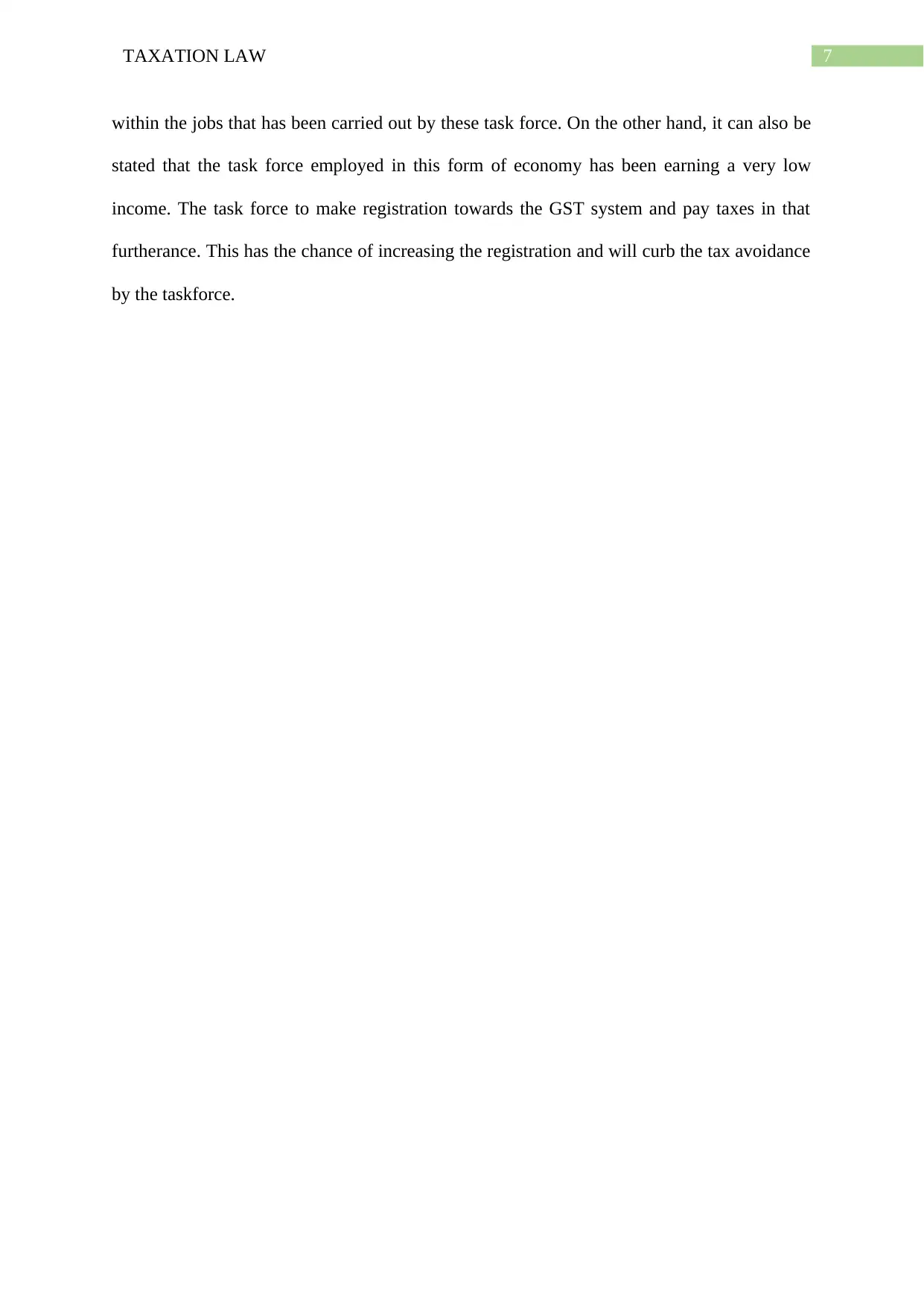
7TAXATION LAW
within the jobs that has been carried out by these task force. On the other hand, it can also be
stated that the task force employed in this form of economy has been earning a very low
income. The task force to make registration towards the GST system and pay taxes in that
furtherance. This has the chance of increasing the registration and will curb the tax avoidance
by the taskforce.
within the jobs that has been carried out by these task force. On the other hand, it can also be
stated that the task force employed in this form of economy has been earning a very low
income. The task force to make registration towards the GST system and pay taxes in that
furtherance. This has the chance of increasing the registration and will curb the tax avoidance
by the taskforce.
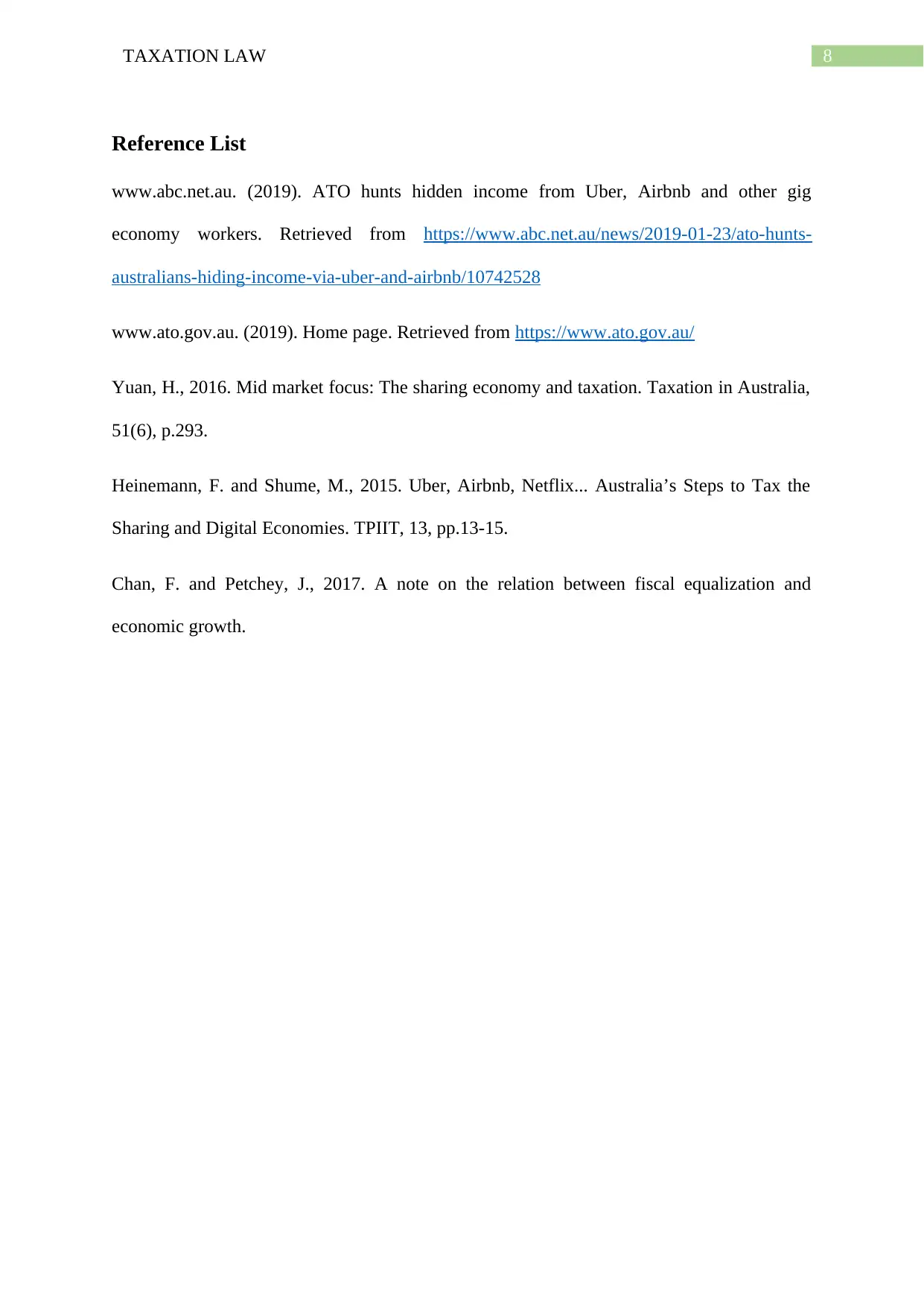
8TAXATION LAW
Reference List
www.abc.net.au. (2019). ATO hunts hidden income from Uber, Airbnb and other gig
economy workers. Retrieved from https://www.abc.net.au/news/2019-01-23/ato-hunts-
australians-hiding-income-via-uber-and-airbnb/10742528
www.ato.gov.au. (2019). Home page. Retrieved from https://www.ato.gov.au/
Yuan, H., 2016. Mid market focus: The sharing economy and taxation. Taxation in Australia,
51(6), p.293.
Heinemann, F. and Shume, M., 2015. Uber, Airbnb, Netflix... Australia’s Steps to Tax the
Sharing and Digital Economies. TPIIT, 13, pp.13-15.
Chan, F. and Petchey, J., 2017. A note on the relation between fiscal equalization and
economic growth.
Reference List
www.abc.net.au. (2019). ATO hunts hidden income from Uber, Airbnb and other gig
economy workers. Retrieved from https://www.abc.net.au/news/2019-01-23/ato-hunts-
australians-hiding-income-via-uber-and-airbnb/10742528
www.ato.gov.au. (2019). Home page. Retrieved from https://www.ato.gov.au/
Yuan, H., 2016. Mid market focus: The sharing economy and taxation. Taxation in Australia,
51(6), p.293.
Heinemann, F. and Shume, M., 2015. Uber, Airbnb, Netflix... Australia’s Steps to Tax the
Sharing and Digital Economies. TPIIT, 13, pp.13-15.
Chan, F. and Petchey, J., 2017. A note on the relation between fiscal equalization and
economic growth.
⊘ This is a preview!⊘
Do you want full access?
Subscribe today to unlock all pages.

Trusted by 1+ million students worldwide
1 out of 9
Related Documents
Your All-in-One AI-Powered Toolkit for Academic Success.
+13062052269
info@desklib.com
Available 24*7 on WhatsApp / Email
![[object Object]](/_next/static/media/star-bottom.7253800d.svg)
Unlock your academic potential
Copyright © 2020–2026 A2Z Services. All Rights Reserved. Developed and managed by ZUCOL.





